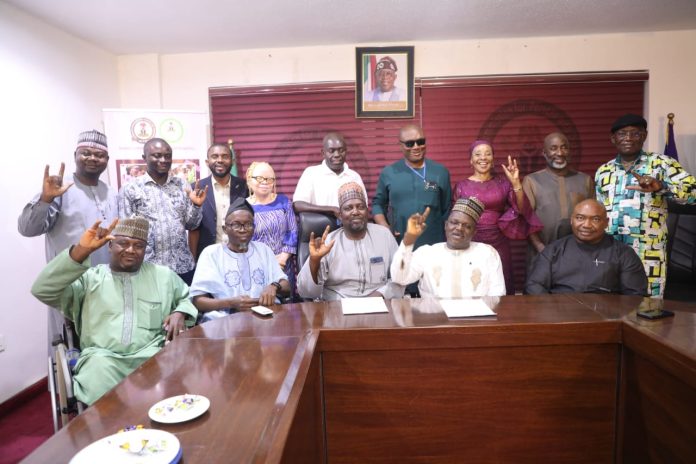In a renewed push for disability rights and inclusion in Nigeria, the National Commission for Persons with Disabilities (NCPWD) and the Joint National Association of Persons with Disabilities (JONAPWD) have reaffirmed their unwavering commitment to improving the well-being of persons with disabilities (PWDs).
During a high-level meeting held in Abuja, key stakeholders discussed the need for stronger leadership, data-driven advocacy, and the full implementation of the Disability Act to foster a more inclusive society where no one is left behind.
A Call for Stronger Advocacy and Collaboration
At the heart of the discussion was the Executive Secretary of NCPWD, Hon. Ayuba Gufwan, who made an impassioned appeal to the Federal Government, policymakers, and disability advocacy groups to scale up their efforts in ensuring the rights of PWDs are fully recognized and protected.
“There is still so much work to be done in securing the fundamental rights of persons with disabilities in Nigeria. We need stronger collaboration between the government, stakeholders, and organizations of persons with disabilities (OPDs) to ensure that PWDs enjoy the same opportunities as every other Nigerian,” Gufwan stated.
He stressed the importance of effective leadership in disability advocacy and urged all stakeholders to work in unity to eliminate systemic barriers preventing PWDs from accessing their rights.
The Need for Accurate Disability Data
A major highlight of the meeting was the urgent need for accurate data on persons with disabilities in Nigeria. Gufwan noted that the lack of comprehensive statistics on PWDs has significantly hindered policy formulation, resource allocation, and targeted intervention programs.
“Without reliable data, it becomes extremely difficult to design and implement effective policies that cater to the real needs of persons with disabilities. We need the support of JONAPWD and other OPDs to help gather accurate and up-to-date data, which will, in turn, attract greater support for disability inclusion across various sectors,” he emphasized.
Commitment to Full Implementation of the Disability Law
One of the key areas of discussion was the full enforcement of the Nigerian Disability Act, which mandates accessibility, anti-discrimination policies, and equal opportunities for persons with disabilities. Gufwan reaffirmed NCPWD’s dedication to ensuring the law is upheld and implemented at all levels of governance.
“We cannot afford to have a situation where PWDs are still struggling to access education, employment, healthcare, and public services. Free education, employment quotas, access to assistive devices, and inclusive healthcare policies must be a reality, not just promises on paper,” he stated.
According to him, removing man-made barriers—such as lack of accessibility in public buildings, workplaces, and transportation systems—is crucial to achieving an inclusive society.
JONAPWD Pledges Maximum Support for NCPWD
In response, the President of JONAPWD, Abdullahi Aliyu, reiterated the association’s unwavering support for NCPWD’s mission. He emphasized JONAPWD’s role as the umbrella body representing all disability clusters in Nigeria and pledged the organization’s full cooperation in strengthening advocacy efforts.
“JONAPWD stands ready to work hand in hand with NCPWD in ensuring that PWDs are not treated as second-class citizens in their own country. We will continue to push for policies that uplift and empower our community,” Aliyu declared.
He also called on government agencies, private organizations, and the general public to change their perception of disability and actively contribute to building a society where everyone, regardless of ability, has equal access to opportunities.
A Step Towards a More Inclusive Nigeria
The meeting concluded with a shared vision between NCPWD and JONAPWD: to intensify advocacy, push for policy reforms, and mobilize resources to enhance the lives of persons with disabilities across Nigeria.
With both organizations reaffirming their commitment, there is renewed hope that the barriers preventing PWDs from achieving their full potential will soon be dismantled.
As Nigeria moves forward, all eyes will be on policymakers and stakeholders to see if this renewed commitment translates into concrete actions that will truly transform the lives of millions of PWDs in the country.


